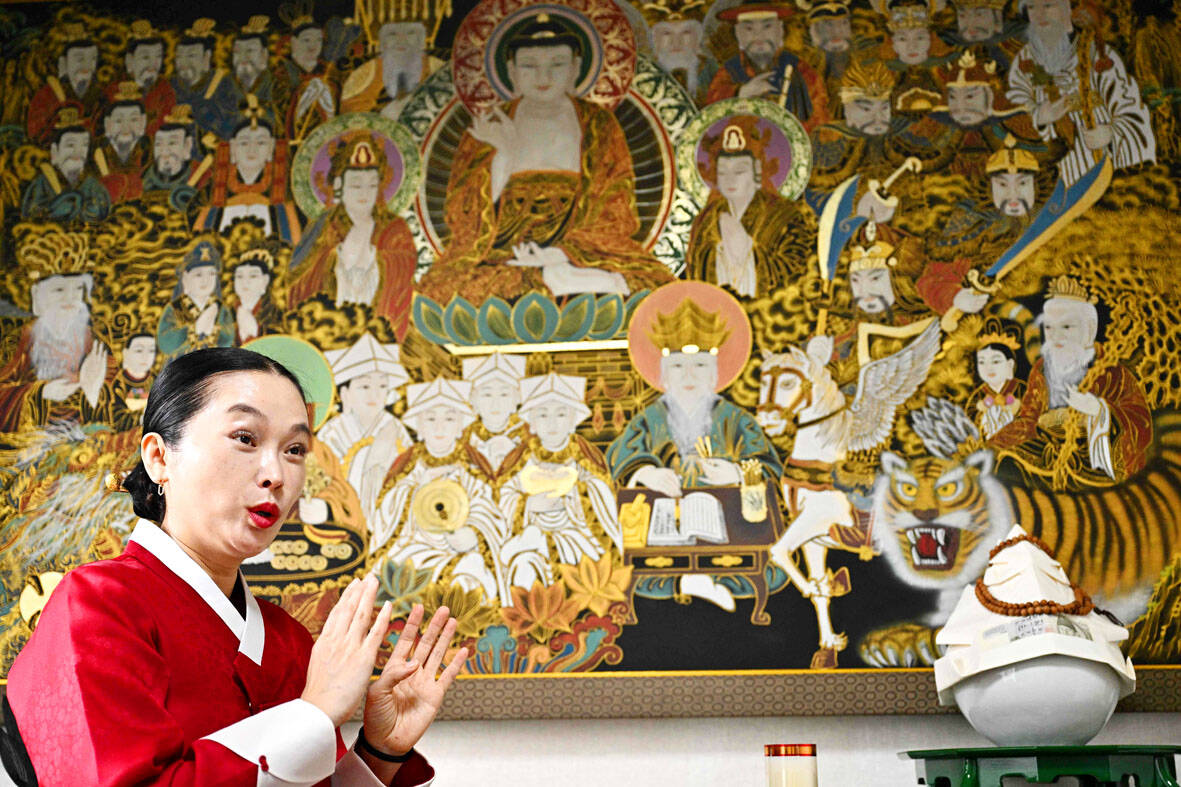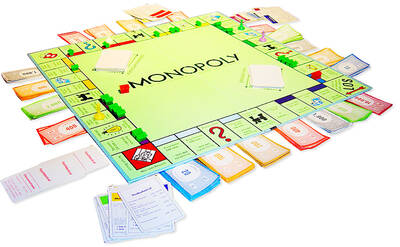The outcome of this week’s presidential elections in South Korea may still be unknown, but shaman Yang Su-bong says the winner came to her in visions years ago.
South Koreans go to the polls today to choose their next president, a snap vote triggered by ex-leader Yoon Suk-yeol’s disastrous declaration of martial law in December.
And for Yang, a traditional Korean mudang, it’s clear that liberal frontrunner Lee Jae-myung will emerge victorious — a prediction that chimes with all major opinion polls that put Lee well ahead in the presidential race.

Photo: AFP
The latest Gallup survey show 49 percent of respondents viewing Lee as the best candidate, while Kim Moon-soo, from the conservative People Power Party (PPP) was trailing on 35 percent.
“From the beginning, I’ve seen Lee Jae-myung becoming president,” Yang said at her office in the western port city of Incheon.
“I saw a presidential aura,” she explained, adding that she faced “criticism and even threats” for her prediction.
“But I can’t lie about what I see.”
Shamanism has shaped culture and belief on the Korean peninsula for centuries.
South Koreans still regularly turn to them for advice on everything from their love lives to important business decisions and cities, and the registrar of the country’s largest shamanic organization lists 300,000 practicing in the country.
But the folk religion has also come under the spotlight for all the wrong reasons — two presidential impeachments have been linked to undue influence allegedly wielded by shamans.
Former President Park Geun-hye was removed from office in 2017 in an influence-peddling scandal involving claims of, among other things, participation in shamanistic rituals.
Ousted ex-leader Yoon and his first lady Kim Keon-hee have also been accused of turning to sketchy shamans when making decisions — including, it is alleged, the fateful martial declaration.
‘INTENSE EMOTIONS’
Claims like that provoke an “intense emotional reaction” in South Korean society — in part because the country’s history is full of leaders led astray by unscrupulous spiritual advisors, said Lee Won-jae, a sociologist at South Korea’s KAIST university.
“When it comes to dramatizing politics, there’s nothing quite as effective as invoking shamanistic themes,” he said.
Mudang or shaman act as intermediaries between the world of spirits and everyday life.
Their elaborate “gut” ceremonies can be hours-long affairs, with cacophonic music, singing and prayers used to ward off evil spirits or hope for a good harvest.
Hit thrillers like last year’s Exhuma — which features a group of shamans fighting an ancient evil spirit — have piqued public interest.
And some shamans now even turn to social media to ply their craft, livestreaming on YouTube and offering advice over video calls.
Shaman Lee Dong-hyeon, who goes by Ohbangdoryeong — “guardian of the five directions” — says he was approached by politicians after predicting Yoon’s untimely fall three years ago.
“To become a truly great person, you must learn to carry burdens,” he said.
Yoon “lacks that destiny,” he said.
And “despite his age, he lacks judgment,” he said.
UNCOMFORTABLE TRUTHS
Ohbangdoryeong engages in “sword rituals” — licking the sharp blade of a knife in a bid to receive messages from deities.
He isn’t so sure that frontrunner Lee will help end South Korea’s political turmoil.
“Things will stabilize for two years, but then there will be bloodshed — political purges,” he darkly predicted.
Fellow shaman Hong Myeong-hui agreed that turbulent times could be ahead.
She said conservative contender Kim Moon-soo has a “quiet fire” in him.
But liberal Lee’s “energy is fast and consuming, like a wildfire in spring,” she said.
“His term will be stormy,” Hong said.
“Prophecy isn’t for pleasing people — it’s for truth. And truth can be uncomfortable.”
No matter if the predictions ring true, what is clear that the new president will have to helm South Korea through a period of economic turbulence, as the trade-dependent nation will be facing steep tariffs from the United States while struggling with sluggish demand at home.

With one week left until election day, the drama is high in the race for the Chinese Nationalist Party (KMT) chair. The race is still potentially wide open between the three frontrunners. The most accurate poll is done by Apollo Survey & Research Co (艾普羅民調公司), which was conducted a week and a half ago with two-thirds of the respondents party members, who are the only ones eligible to vote. For details on the candidates, check the Oct. 4 edition of this column, “A look at the KMT chair candidates” on page 12. The popular frontrunner was 56-year-old Cheng Li-wun (鄭麗文)

“How China Threatens to Force Taiwan Into a Total Blackout” screamed a Wall Street Journal (WSJ) headline last week, yet another of the endless clickbait examples of the energy threat via blockade that doesn’t exist. Since the headline is recycled, I will recycle the rebuttal: once industrial power demand collapses (there’s a blockade so trade is gone, remember?) “a handful of shops and factories could run for months on coal and renewables, as Ko Yun-ling (柯昀伶) and Chao Chia-wei (趙家緯) pointed out in a piece at Taiwan Insight earlier this year.” Sadly, the existence of these facts will not stop the

Oct. 13 to Oct. 19 When ordered to resign from her teaching position in June 1928 due to her husband’s anti-colonial activities, Lin Shih-hao (林氏好) refused to back down. The next day, she still showed up at Tainan Second Preschool, where she was warned that she would be fired if she didn’t comply. Lin continued to ignore the orders and was eventually let go without severance — even losing her pay for that month. Rather than despairing, she found a non-government job and even joined her husband Lu Ping-ting’s (盧丙丁) non-violent resistance and labor rights movements. When the government’s 1931 crackdown

The first Monopoly set I ever owned was the one everyone had — the classic edition with Mr Monopoly on the box. I bought it as a souvenir on holiday in my 30s. Twenty-five years later, I’ve got thousands of boxes stacked away in a warehouse, four Guinness World Records and have made several TV appearances. When Guinness visited my warehouse last year, they spent a whole day counting my collection. By the end, they confirmed I had 4,379 different sets. That was the fourth time I’d broken the record. There are many variants of Monopoly, and countries and businesses are constantly